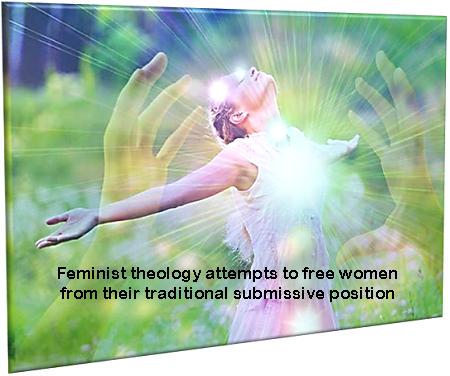The Virgin Birth Stumbling Block for Feminist Theology
The Virgin Birth Stumbling Block for Feminist Theology

Mary in Feminist Theology⤒🔗
Feminist theology has become a force to be reckoned with in the world of theology. A feminist approach to theology is now taught all over America and Europe. It can be found in the Roman Catholic Church as well as in the Protestant churches. Everywhere, women are studying how the Bible can be related to issues that are liberating for them. One of the main sources for inspiration are the women portrayed in Scripture. When they see how these women, in their time, stood up for their rights they are encouraged to continue their struggle for recognition of their place and right. At stake is nothing less than liberation after centuries of oppression.
Mary, the mother of the Lord, is one of the women looked to for inspiration. That led to a disappointment, however. Mary appeared too submissive; she appeared unsuitable to be used in the context of feminism. In fact, Mary was rejected by early feminist theologians as a possible identification figure.1
In feminist circles today, however, the attitude toward Mary is more positive. They now see that Mary was not at all a passive and meek person; rather, she was a heroine. Lavinia Byrne points out that Mary supported her son during his crucifixion, when all his male disciples had fled. Mary followed her son's adventurous life, says Ivone Leal. Even though she realized that Jesus' attempt was doomed to failure Mary continued to support him. And another theologian, Mary O'Driscoll, refers to Mary's song to prove that Mary stood up for the poor and the oppressed.2
Together with other women, Mary is now used as an example to be followed by women today. At this point we have to resist the temptation to deal with the exemplaric character of this explanation and show the importance of the redemptive historical approach.3 There is something else that deserves our attention. The best known part of Mary's life remains unmentioned. It is that part which caused her name to be included in the Apostles' Creed, the virgin birth. Mary herself said: "For behold, henceforth all generations will call me blessed For He who is mighty has done great things for me," (Luke 1:48f) but many women feel they cannot call the Mary of the virgin birth blessed.
The question arises why this most important part of Mary's life does not function in feminist theology.
Two Problems←⤒🔗
The reason why the virgin birth is neglected is that at this point of her life Mary provides no inspiration whatsoever for women. Feminist theology, as a variation of liberation theology, wants to liberate women from the subservient position they have occupied in society and church for many centuries. Women were under male dominance and therefore were unable to be themselves. Feminist theology attempts to free women from their traditional submissive position. Women should be allowed to establish their own identity. Their outlook and approach should be recognized as legitimate. They should be recognized as themselves, and not as some man's wife or somebody's mother.

From this perspective Mary, in particular the Mary of the virgin birth, must appear as a hindrance, rather than an asset. She occurs at this point in the Bible only in connection with Jesus. She is not described in her own right but as the mother of Jesus. As long as Mary is only pointing toward Jesus, as long as she is the receptive woman in contrast to her son who is the creative person, she cannot inspire women.4
Another problem for feminist theology is the emphasis on Mary as mother. This leads to a glorification of motherhood, as if that is the only real destination of women. The story of the virgin birth is yet another example of a story about women who are no more than homebodies, women who have no influence in a male dominated society. Roman Catholic theology is seen as even worse than Protestant theology since it emphasizes that Mary is the ever-virgin. This is seen as a denial of female sexuality.5 For feminist theology it is imperative to do away with the virgin birth, for the reason that it hinders the liberation of women.
Two Solutions←⤒🔗
Several attempts have been made to remove this offensive part of Christian theology. The less disruptive solution is to reinterpret its meaning. The virgin birth should be interpreted from the last words of Mary: "Behold, I am the handmaid of the Lord, let it be to me according to your word" (Luke 1:38). These words show that Mary is not just the simple handmaiden who meekly submits to whatever is happening to her. She is active in her response to God's offer. If there is a dependence, says Halkes, it is on the side of God. Cod has made Himself dependent on a person who was receptive to Him. What Mary does is not passive submission but active receptivity.6 It is noteworthy that feminist theology here approaches Roman Catholic theology with its idea that in Mary humanity participated in the work of salvation by bringing forth the Saviour.
The text itself contradicts this explanation. The word "handmaid" or "servant" in which Mary summarizes her position indicates her submission to God. The words indicate Mary's humble acceptance of the will of God.7 There is no indication that God made Himself dependent and asked for Mary's permission. The angel did not wait for Mary to consent that a son would be born from her; he announced that she would give birth to a son (Luke 1:31). It would, however, not bother many feminist interpreters that their interpretation is not given in the text. They are not in the first place interested in what the Bible says, but in what they can use for their feminist agenda.
For other theologians, the explanation that Mary gives permission to the angel is not sufficient to accept this story. Mary would still be secondary; her importance depends on the importance of her Son. More radical measures are needed. They come with the following reasoning. The virgin birth is mentioned only in two passages in the Bible, in the introductory chapters of Matthew and Luke. These chapters do not record historical events, they are added to the story of Jesus at a later time. They were "included because it was felt necessary to reflect in faith about the mystery of the incarnation."8 In plain words this means that no angel appeared to Mary. He did not announce to Mary that a son would be born to her. Neither did he make known the mystery that the Holy Spirit would work the miracle of the virgin birth. The early church added all these elements to the greater glory of Jesus.
As if that is not enough, the virgin birth takes on a new meaning. Halkes appeals to the results of the study of comparative religion. According to her, the veneration of Mary should be explained against the background of the worship of the virgin goddess. "The dogma of Mary's virginity is connected with the very early mystery of the great goddess who was a virgin." This goddess is independent and self-contained. She does bear children but is not dependent on a man.9 The virgin birth becomes the story of the independent woman who does not need a man, not even for child birth.
The Necessity←⤒🔗
This is, of course, a bizarre interpretation. It is utter nonsense to explain the biblical story of the virgin birth as a variation on the theme of the great goddess mother earth, giving birth to every living thing. If one wants to believe in a fertility goddess, why not reject the record of the virgin birth altogether, rather than going to such ridiculous lengths in reinterpreting the biblical story.

We should do more, however, than shrug this off. We have to ask the question why the feminist theologians cannot accept the biblical account of the virgin birth as it is recorded. We have to go back to the beginning. What do these theologians use the Bible for? They only seek support for their opinion that women should be liberated from their position of submission. In their quest they come across one of the most prominent women in the Bible: Mary, and the central event in her life: the virgin birth. This story does not help them, however, in their pursuit of realizing liberation for women. That is the reason why the story of the virgin birth had to be reinterpreted, excised or turned into its opposite: the affirmation of female sexuality.
The root of their difficulties with the virgin birth is that feminist theology has identified the wrong problem. According to these theologians the basic problem of humankind is female oppression and submission. When that problem is solved the world will be a better place to live. The real problem of this world, however, is sin, sin in men as well as in women.
And since the feminist theologians begin with the wrong problem, they also come with the wrong solution. For the real solution is not the liberation of women but the removal of sins. Men as well as women have sinned and stand condemned before God and mankind is unable to solve this problem. The solution has to come from the outside. The Son of God has to come into this world for the salvation of sinners. The story of the virgin birth does not concentrate on Mary who brings a child into the world, but on God who uses her to bring the Saviour into this world.
Feminist theologians stumble over the story of the virgin birth for the very reason that they want to bring about their own salvation. But the story of the virgin birth shows us, rather, that salvation for men as well as for women, is from God. We can only reject the virgin birth at the cost of cutting the heart of God's grace out of the gospel.
We will call Mary blessed (Luke 1:48), not because she stood up for herself, but because God has done great things for her. She fulfilled that small but glorious task in the history of God's salvation work: to become the mother of our Saviour.

Add new comment